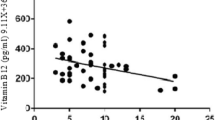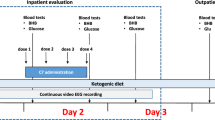Abstract
RECENT studies have established a relationship between vitamin B6 metabolism and convulsive disorders of the nervous system. Pyridoxine deficiency in young animals and human infants and the administration of pyridoxine antagonists in animals have been observed to cause convulsive activity which is rapidly alleviated by administration of pyridoxine1,2. Several instances have been reported of children with abnormally high vitamin B6 requirements1,3. On ordinary dietary vitamin B6 intake, they appear, at least as regards their nervous system, to be suffering from a relative vitamin B6 deficiency and are subject to convulsions which are rapidly terminated by pyridoxine administration, or entirely prevented by pyridoxine supplementation of the diet. In order to investigate further the nature of the cerebral metabolic disturbances occurring in vivo in vitamin B6 deficiency, measurements of cerebral blood flow, oxygen consumption, and respiratory quotient were made in one of these pyridoxine-dependent children during a period of seizure activity induced by withdrawal of pyridoxine from the diet and immediately after its alleviation by parenteral administration of pyridoxine.
This is a preview of subscription content, access via your institution
Access options
Subscribe to this journal
Receive 51 print issues and online access
$199.00 per year
only $3.90 per issue
Buy this article
- Purchase on Springer Link
- Instant access to full article PDF
Prices may be subject to local taxes which are calculated during checkout
Similar content being viewed by others
References
Tower, D. B., Amer. J. Clin. Nutr., 4, 329 (1956); Nutr. Rev., 16, 161 (1958).
Killam, K. F., and Bain, J. A., J. Pharmacol. and Exp. Therap., 119, 255, 263 (1957).
Hunt, jun., A., Stokes, jun., J., McCrory, W. W., and Stroud, H. H., Pediatrics, 13, 140 (1954).
Lassen, N. A., and Munck, O., Acta Physiol. Scand., 33, 30 (1955).
Kety, S. S., and Schmidt, C. F., J. Clin. Invest., 27, 476 (1948).
Kennedy, C., and Sokoloff, L., J. Clin. Invest., 36, 1130 (1957).
Davies, P. W., Grenell, R. G., and Bronk, D. W., Fed. Proc., 7, 25 (1948).
Schmidt, C. F., Kety, S. S., and Pennes, H. H., Amer. J. Physiol., 143, 33 (1945).
Kety, S. S., Woodford, R. B., Harmel, M. H., Freyhan, F. A., Appel, K. E., and Schmidt, C. F., Amer. J. Psychiat., 104, 765 (1948).
Roberts, E., and Frankel, S., J. Biol. Chem., 188, 789 (1951). Roberts, E., Rothstein, M., and Baxter, C. F., Proc. Soc. Exp. Biol. Med., 97, 796 (1958).
Author information
Authors and Affiliations
Rights and permissions
About this article
Cite this article
SOKOLOFF, L., LASSEN, N., McKHANN, G. et al. Effects of Pyridoxine Withdrawal on Cerebral Circulation and Metabolism in a Pyridoxine-dependent Child. Nature 183, 751–753 (1959). https://doi.org/10.1038/183751b0
Issue Date:
DOI: https://doi.org/10.1038/183751b0
This article is cited by
-
DNA repair protein APE1 is involved in host response during pneumococcal meningitis and its expression can be modulated by vitamin B6
Journal of Neuroinflammation (2017)
-
Zum Krankheitsbild der Vitamin B6-(Pyridoxin)-Abhängigkeit beim Neugeborenen
Zeitschrift für Kinderheilkunde (1964)
Comments
By submitting a comment you agree to abide by our Terms and Community Guidelines. If you find something abusive or that does not comply with our terms or guidelines please flag it as inappropriate.



